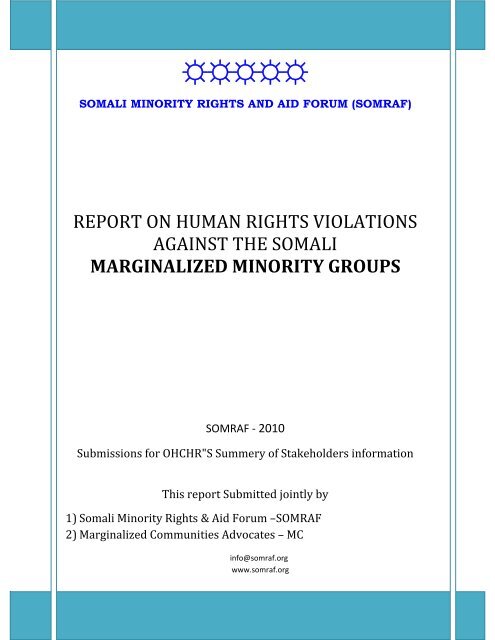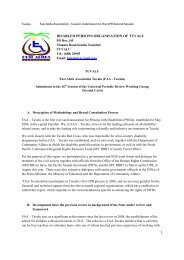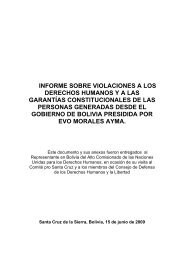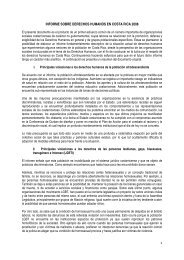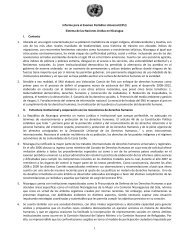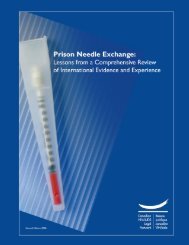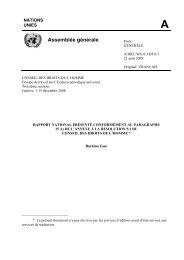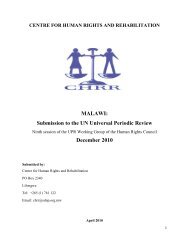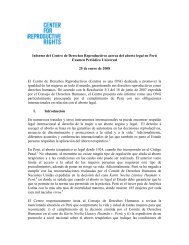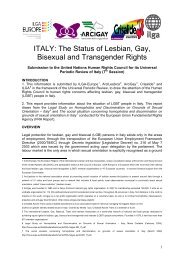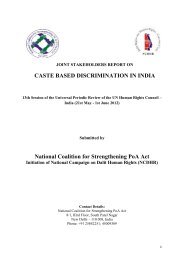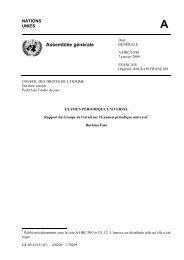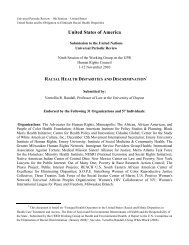Page 1 SOMALI MINORITY RIGHTS AND AID FORUM
Page 1 SOMALI MINORITY RIGHTS AND AID FORUM
Page 1 SOMALI MINORITY RIGHTS AND AID FORUM
You also want an ePaper? Increase the reach of your titles
YUMPU automatically turns print PDFs into web optimized ePapers that Google loves.
☼☼☼☼☼<br />
<strong>SOMALI</strong> <strong>MINORITY</strong> <strong>RIGHTS</strong> <strong>AND</strong> <strong>AID</strong> <strong>FORUM</strong> (SOMRAF)<br />
REPORT ON HUMAN <strong>RIGHTS</strong> VIOLATIONS<br />
AGAINST THE <strong>SOMALI</strong><br />
MARGINALIZED <strong>MINORITY</strong> GROUPS<br />
SOMRAF ‐ 2010<br />
Submissions for OHCHR"S Summery of Stakeholders information<br />
This report Submitted jointly by<br />
1) Somali Minority Rights & Aid Forum –SOMRAF<br />
2) Marginalized Communities Advocates – MC<br />
info@somraf.org<br />
www.somraf.org
The Situation of Somalia: Background and Introduction<br />
Somalia’s new phenomenon of state failure is rare in the modern history of mind kind and not<br />
comparable to any country. The situation is changing frequently like moving sands, it is getting more<br />
critical in all aspects, as the country experienced a full breakdown of state functioning on all three<br />
dimensions, security, legitimacy/rule of law and welfare. The country is considered on the of the poorest<br />
country in the world, the situation aggravated by the civil war inherited incomparable human rights<br />
violations, absolute destruction of social and economic infrastructures across the Country, and eventually<br />
caused inadequacies of service deliveries. The civil war in Somalia was to a large extent a clan-based<br />
war, a very violent and destructive war in which the various population groups and clans have accused<br />
each other of committing physical violence and abuses, including murder, rape, abduction, looting etc.<br />
However, social segregation is a deep-rooted social issue that divides the Somali society into two<br />
categories; laan-deer (Majority-long brunch) (noble) and laan-gaab (minority – short brunch) (inferior).<br />
In Somalia, it is generally the case that noble groups are those belong to the culturally dominant group of<br />
transhumant pastoralists, who form nearly sixty per cent of the total population. Groups that are not<br />
pastoralist are often considered inferior or minority groups. The situation of occupational minority groups<br />
deteriorated further as overall situation of the country got worse. In fact, in the absence of a legitimate<br />
state authority and accepted rule of law, a society, a nation, and country like Somalia will find itself in a<br />
state of turmoil and anarchy where only the strongest clans survive. Pillage, robbery, rape and<br />
enslavement of the unarmed and unprotected is a means of control and domination and ultimately<br />
survival. Those who have no means of protection or can seek retribution like minorities (youth, women &<br />
children) they are easy targets and find themselves vulnerable and disadvantaged people which are the<br />
case of Somali vulnerable marginalized minorities.<br />
The Situation of Somali minorities Communities<br />
The problem of Somali marginalized minority groups continued to worsen without any intervention or<br />
remedies necessitating the establishment of SOMREF to fill the information gaps regarding minority<br />
group's socio-economic status and build a frame of cooperation with all related bodies such us aid<br />
agencies, donors, foundations & policy makers to explore interim intervention and explore durable<br />
solution in the abhorring human rights facing the community as well as address their immediate<br />
humanitarian needs. Beyond any doubt, the populations, especially in southern parts of Somalia, have<br />
suffered severe losses in human as well as material terms. Marginalized minority communities across the<br />
country are excluded and disadvantaged community in Puntland, Somaliland and southern parts of<br />
Somalia due to a complex multi dimensional challenges cannot bed detailed here and the complex nature<br />
of Somali conflict. Accordingly, Somalia marginalized minority communities are facing disaster<br />
human and humanitarian situation, extreme poverty and hunger which can lead is causing slow<br />
collective death, as members of these communities, especially women youth and children are suffer most<br />
from various forms human rights abuse, social and economic deprivation, including hunger and<br />
malnutrition, inadequate healthcare, limited access to education, and low self-esteem etc. Due to the<br />
above reasons, the minorities are the neediest group of people facing worst starvation, highest poverty<br />
rates, massive displacement, huge unemployment figures, highest illiteracy levels and horrific health and<br />
sanitation status. Unlike other clans from dominant groups, minorities lack international support due the<br />
prolonged Somali conflict which creates an environment where minority groups are vulnerable and<br />
abnormally displaced from their homes. Therefore, they suffered grievous human rights violations, which
included extra judicial killings, appropriation of lands and properties, and forced displacement from their<br />
lands to IDP or refugee camps situated along the Somalia Ethiopia border.<br />
POVERTY & EXCLUSION<br />
The first goal of the MDGs is the eradication of extreme poverty and hunger. The key to poverty<br />
alleviation is economic growth and the creation of employment for all. However, poor people without<br />
employable skills cannot benefit from the growth process. Historically, Somali inhabitant horn of Africa<br />
regions has been one of the most unequal regions of the world... but there are grounds for cautious<br />
optimism with regard to equity of progress on the MDGs.<br />
<strong>MINORITY</strong> ABUSES IN <strong>SOMALI</strong>A<br />
After the collapse of Somalia central government in 1991, the country disintegrated into regions and<br />
districts controlled by warlords and clan militias from majority tribes. Clan protection became the only<br />
means to safeguard the individuals and their properties. Due to their lower population and status, the<br />
minority groups were unable to mobilize clan militia to protect themselves. Unlike the other armed<br />
majority tribes, the minority groups became a soft target to the powerful warlords and the clan militias as<br />
the perpetrators and their tribes were not at the risk of revenge or reprisal. As a result, the minority<br />
groups have been subjected to various forms of human rights abuses. Many people from minority groups<br />
have been brutally killed and murdered for different reasons. The magnitude of killing reached to the<br />
extent that such terminologies (looma ooyaan) meaning ‘’the un-mourned one’’ and ‘’looma aaraan’’ the<br />
un-revenged one and ‘Sacabooley’, ‘’unarmed’’ have emerged in Somalia. This shows the highest<br />
vulnerability of minority groups and their properties. As well, it shows that no one cared of the death and<br />
suffering of minority person and loss of his or her property.<br />
According to minority groups interviewed, there have been various forms of killings and for different<br />
reasons. Some have been shot dead:<br />
May father and brother were killed by the Abgal clan of Hawiye tribe in Karaan neighbourhood<br />
of Mogad i ishu. Our shops, cars and houses have been confiscated by them. ii<br />
In another accident, three men were executed for stabbing to death of another man:<br />
Abdinasir Abdilahi Saleebaan, Mohamed Sahild Oldad, and another one from Madiban minority<br />
group between the ages of 20-25 years were executed by Puntland authority after one of them<br />
found guilty of stabbing a man from the majority to death in Bossasso in 2008. Another one was<br />
found guilty in catching the hands of the deceased victim while being stabbed. The third one was<br />
found guilty of chasing the girl friend of the victim in order to take a mobile cell phone from her.<br />
All the three were put to death without considering the level of the crime each one committed iii .<br />
Even pregnant women married to the majority clans have not been spared from brutal killing and<br />
mistreatment.<br />
On 3 rd June, 2007, Halimo Abdi Hashi was shot dead with five bullets by her husband Ismail Abdi<br />
Ganey in Garowe, Puntland region of Somalia after she refused to give him her money. She was<br />
not buried for five days and her body was rotten inside the house. The perpetrator was and is still<br />
at large iv .<br />
Children have also been killed and murdered with broken glass.
In February 2009, Abdi Hashi Farah Dhimbil, 16 years old boy and another boy from majority<br />
clan fought in Bossasso. During the fighting, other majority individuals supported the majority<br />
one and caught Abdi’s hands. Then Abdi was slaughtered with a broken glass v .<br />
In another similar accident, another child lost his life.<br />
In 2006, Hassan Mohamoud Abdi dhere, 15 years old Madiban minority group was drowned to<br />
death at night time after fighting with another boy from majority reer Hagar/dhulbahante sub-clan of<br />
Darod in Hagar burburis village in Somali region of Ethiopia opposite to Buhodle district. The next<br />
morning he was found dead in the Berkad, his hands tied together vi .<br />
Others have died after serious torture and beating with clubs and gun butts.<br />
In 2005, Abdi Hassan Ahmed from Madiban minority in Galka’ayo controlled by Puntland was<br />
jailed in the central police station after fighting and defeating another man from majority<br />
Majerten tribe. The relatives of the majority one came and paid money to the police gaurds and<br />
tortured Abdi until he died in the police station in Galka’ayo. vii<br />
Still others have been burnt alive.<br />
On 16 August, 2004, around 9 PM, Mohad Said Nour my husband was called and taken by his<br />
friend to his house. He was sick at that time. After twenty minutes, he was taken back to his house<br />
being completely burnt. His hands were tied together and then petrol was poured onto him and<br />
ignited. Five days later, he died in Barkhadle hospital in Bossasso, Puntland region of<br />
Somalia. viii<br />
Many people have been killed for confiscating and taking away the properties of the victims. Others<br />
have been killed while preventing their daughters from rape.<br />
In 2007, the Ethiopian attacked our neighbourhood Hurwaa in Mogadishu. There were no<br />
opposition forces in the area. If the Ethiopian did not find opposition forces firing, then they used<br />
to rape women and loot valuable properties from the civilians. The Ethiopian forces were<br />
wearing military uniforms and driving technicals (vehicles mounted with heavy weapons). They<br />
spoke foreign language. I got the word ney meaning come in Amharic (Ethiopian language). Ten<br />
men came to our house and forcefully took and lifted my sister. My father tried to defend and<br />
prevent her from being raped. He was shot dead instantly. My younger who was a child threw<br />
stones at them and was also shot dead. My sister was raped, slaughtered and thrown into a<br />
garbage pit near the neighbourhood by the Ethiopians nine hours after they took her ix .<br />
The Hayat hospital diagnosed the body and verified the rape and slaughtering. Khadra Ahmed Yusuf, 28<br />
years old woman was the eyewitness and verified the crime.<br />
In 2006, Mohamoud Abdi Dhere died after being beaten with AK47 gun butts in Bossass, by the<br />
police in Puntland region of Somalia in 2006 while trying to defend his daughter from rape.<br />
Minority activists have disappeared in hands of powerful warlords. Conflict between the victim and<br />
Abdillahi Yusuf over the representation of minority groups in Puntland and Somalia Reconciation<br />
conference in Kenay was reported.<br />
The articulate minority activist and traditional leader in Puntland, Garaad Abdilahi Olad Ibe was<br />
taken away from his house in Bossasso in June 2003 by then Puntland presidential guards of Abdillahi<br />
Yusuf driving small car called Mark 11. He first went to them to ask who they were. He came to me and<br />
said that then President was calling him. He disappeared and never came back x .
The minority community and his family believe that he was either shot dead and buried inside the<br />
compound of Puntland Presidential balance in Bossasso or was imprisoned in American Secret terrorist<br />
Detention jail (ship) in Djibouti being falsely accused of Alqa’ida membership. The family is appealing<br />
to international communities and human rights organizations to identify his whereabouts if he is alive.<br />
Extra-judiciary killings have been reported even in safer areas. Many others have been caught in<br />
crossfire. Close relatives of the deceased victims from Minority groups have been denied blood<br />
compensation (diya) by both the majority clans and Puntland administration as per the agreement reached<br />
earlier.<br />
In 2007, Hussein Yusuf Ali, 70 year old man was knocked down by a lorry in Bossasso. Seven<br />
days after he died. The court released the perpetrator on bail. The majority clan denied that the<br />
victim died because of the knock down and refused to pay the blood money xi .<br />
Similarly<br />
In 2007, Abdiqadir Mahdi Omer Afweyne died after accidentally hit by a bullet fired by Bossasso<br />
police who wanted to disperse angry protesters. The Puntland administration and Ali Saleban<br />
sub-clan of Majerten/<br />
Darod refused to pay the blood money xii .<br />
In another accident, 14 years old minority from Madhiban died.<br />
In April 2007, special presidential bodyguards of the former Puntland president, Ade Muse open<br />
fired to disperse angry protesters in Bossasso and accidentally shot dead 14 years old Abdi<br />
Abdillahi Mire. Although the former president authorized the payment of the blood compensation,<br />
the former finance ministry-Gaagaab refused to pay on the pretext of lack of money. However, he<br />
paid similar blood compensation to the majority clans xiii .<br />
Rape is another form of human rights violation and abuses. Like the clan protection mentioned, minority<br />
women and girls have been continuously raped or gang-raped. Lack of protection in south central<br />
Somalia and lack of law enforcement in Puntland state of Somalia have contributed to extremely high<br />
level of rape cases.<br />
While Nim’o Mohahoud Abdi, 17 years old Madiban girl and her mother who work in selling<br />
meat were slaughtering sheep at home when the Bossasso patrolling police suddenly came to<br />
their house at 3:00 AM after midnight. They wanted to rape both the girl and her mother, but<br />
found the mother was pregnant and bit old. They lifted the girl in their vehicle and gang-raped.<br />
The father Mohamoud Abdi Dhere tried to defend his daughter from rape, was beaten severely<br />
with AK47 gun butts. Few days later he died as a result of the beating xiv .<br />
The rape cases occurred in the rural, urban and IDP camps.<br />
In 2006, a 17 years old Yibir minority girl, Hodan Hussein Jama, was gang-raped by seven men<br />
from majority Ali Saleban sub-clan of Marjerten/Darod in Armada village, Bossasso, Puntland<br />
region of Somalia. Although the police in the area arrested and transferred to perpetrators to<br />
Bossasso, the former vice minister in charge of security released them from the police station.<br />
Ever since, the victim has been sick and suffering from serious problems xv .<br />
A Bandabow family from minority Banadiri community faced one of the most serious human rights<br />
violations from the Ethiopian forces in Mogadishu. This brutal shooting down the father and younger<br />
brother and raping, slaughtering the girl and throwing her body into garbage pit.<br />
In 2008, after attacking the area, Ethiopians forces raped, slaughtered my sister Ina Mohamed<br />
Elmi and threw her into a garbage pit near the Hurwaa neighbourhood in Mogadishu the nine<br />
hours after they took her. They also shot dead my father and younger brother xvi .
According to women in Ajuran minority IDP camps and other minority groups in Bossasso, rape is<br />
extremely high and is becoming part of their daily life.<br />
There is no a single woman safe from rape. At night, armed gunmen come to the IDP camp and<br />
forcefully drive women and girls out of their shelters and rape outside the camp. Rape cases<br />
occur two times a week.<br />
In Puntland, the IDPs and minority communities are not protected and gunmen hunt women and girls.<br />
The police who could safeguard the vulnerable women and girls are heavily involved in the rape cases.<br />
In early morning in 2004, while we (12 women) going for work, a small vehicle came and stopped<br />
beside us. Some of us ran away, however, they caught me. 13 years old girl who initially ran<br />
away came back to me because she did not know what was going on. We were taken to Bossasso<br />
beach and gang-raped. Two men raped me and the 3 raped the 13 years old girl. I was bleeding<br />
victims and went to the nearest police station to inform the problem. Surprisingly I saw the one of<br />
the perpetrators at the police station wearing on his head a small piece of cloth of mine. He was<br />
also drunk. When I informed the police, the police replied that he was officer in charge of that<br />
police station and that they were not in a position to jail him However, no disciplinary action has<br />
been taken nor any prosecution in the front of the law..<br />
The impact of rape and gang-rape has been substantial. Raped women have been forced to leave their<br />
homes due to stigma. Others have been seriously sick and become infertile. Others have been suffering<br />
from gynaecological disorders and various sexual transmitted diseases.<br />
The confiscation of fixed assets and taking away other valuable properties from minorities groups have<br />
continued since early 1990 s . Due to lack of protection, the minority groups and their properties are<br />
vulnerable to armed attacks and loss of productive assets. As a result of this deprivation, many minority<br />
households became destitute and poorest of the poor. Others were forced to flee to neighbouring<br />
countries. All the impoverished households in Kenya and Somalia live in the worst living conditions and<br />
standards and need urgent humanitarian support.<br />
LACK OF ACCESS TO JUSTICE & EDUCTION<br />
Minorities are denied of justice. In Somaliland, the justice system is one of the most corrupted and<br />
marginalizes the minority groups and the poor. Land disputes are very common and contribute to<br />
accidents of killing and clashes. The courts also perpetuate the social and economic discrimination and<br />
exclusion. There are also multiple laws are employed in the society. Sharia law, customary law and<br />
Indian Bible cords.<br />
In Somalia, there are no government courts with the exception of the Puntland autonomous region. There<br />
is law and order in this part of the country. It was also areas where different groups fought to come to<br />
power. Human rights and minority have severely violated and abused. Killing, slaughtering, massacre,<br />
rape, abduction, destruction of civilian properties, civilian shelling and bombardment as well as<br />
displacement have all occurred.<br />
The international communities have not taken tough measures to prosecute human rights violation and<br />
abuses in Somalia. Al Shabab Al Mujahidin controls most of the regions in the region in the south and<br />
some regions in the central Somalia. There are no fully functioning and visible courts in this area. Many<br />
minority groups may not know where to go to prosecute perpetrators. However, reports from the areas<br />
indicate no serious injustice on the part of the minority groups.
In Puntland state of Somalia, the existing justice system is also one of the most corrupted. Majorities of<br />
Judges are bribed and their decisions are usually in favour of the bribers. The minority groups encounter<br />
serious injustice both from the authority and the communities. To de-motivate the minorities and other<br />
poor people, the process of judgement is deliberately delayed in the corrupted justice systems so that the<br />
poor will be able financially to regularly come to the court. The Puntland authority has not sufficiently<br />
acted on the many cases of killing, torture, beating, slaughtering, rape that occurred in their territory.<br />
These abuses are explained in the above section and will be looked at one bz one to investigate how the<br />
judiciary dealt with.<br />
Mohamed Abdi Dhere, the father who tried his best to defend his daughter was severely beaten with base<br />
of guns. Few days later he died of such torture and beating. In the morning, they went to the police<br />
station to inform the case. The police replied that the perpetrators were not policemen and that the victims<br />
should identify the responsible men and if not should leave the police station. The police have not taken<br />
any action to investigate the matter. This is mainly when they came to know that the victims were from<br />
the minority groups.<br />
Likewise courts in Puntland behave in the same way as the police. The courts force the victims to identify<br />
the perpetrators or drop their cases.<br />
Mohad Said Nour who was burned alive and who few days later died in the hospital in Bossasso in 2004,<br />
his case was taken to the court. The District Court has sentenced the perpetrator to death as per Sharia<br />
law. According to court’s verdict, there were many other perpetrators involving in the same case, who<br />
were not sentenced. Much worse, The Court of Appeal has suspended the case until the son of the<br />
deceased victim who was at the age of five would become fifteen years old. The relatives of the deceased<br />
victim and clansmen insisted on the prosecution of the murder and they were ignored.<br />
However, when the members from minority clans stabbed to death a man from the majority, the decisions<br />
are reached within few hours or days at maximum without giving enough time to bring lawyers and time<br />
to prepare for defence in the trial. A good example is that three men from the minority groups who have<br />
been accused of killing a man in Bossasso.<br />
Only one of them was found guilty and that convinced that he had stabbed the victim in the head.<br />
The second was found guilty of holding the hands of the deceased victim. The third was found<br />
guilty of chasing the girl friend of the victim in order to rob her mobile. The following morning,<br />
Bosasso local court sentenced to the death to the first, fifteen and ten years of imprisonment<br />
respectively to the second and third. In the same day, the Court of Appeal hastily sentenced all the<br />
three to death without giving time to get lawyers to defend the accused men. Immediately they<br />
were shot dead and left in that place. The clansmen of the victim put pressure on the court to<br />
sentence all the three to death or that they would do so.<br />
Halimo Abdi Hashi, the pregnant woman shot dead by her husband, the Puntland authority has not taken<br />
action any action even jailing the criminal. The minority clan and the majority clan discussed the matter<br />
outside the court with very high power inbalance.<br />
NOTE:<br />
This Reports on only covering Somaliland, Puntland as<br />
south-central Somalia is worse that detailed above.


